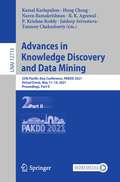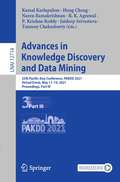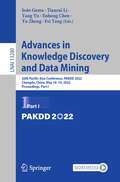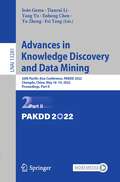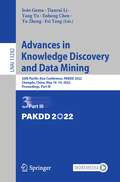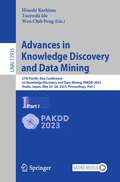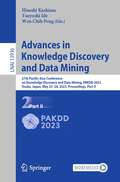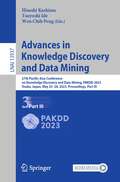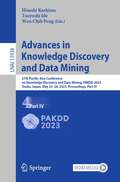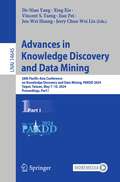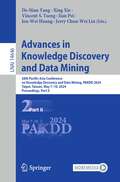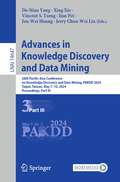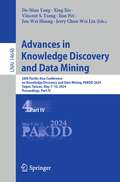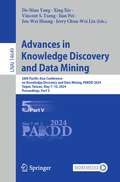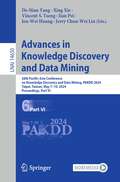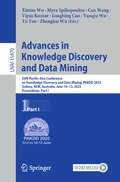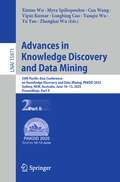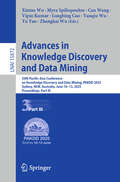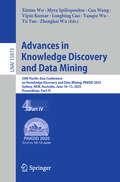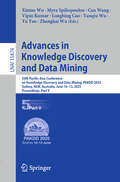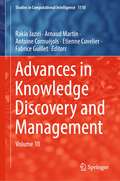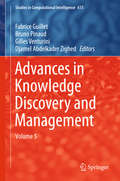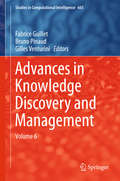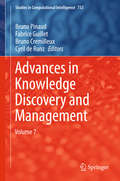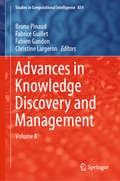- Table View
- List View
Advances in Knowledge Discovery and Data Mining: 25th Pacific-Asia Conference, PAKDD 2021, Virtual Event, May 11–14, 2021, Proceedings, Part II (Lecture Notes in Computer Science #12713)
by Hong Cheng Jaideep Srivastava P. Krishna Reddy Tanmoy Chakraborty Naren Ramakrishnan Kamal Karlapalem R. K. AgrawalThe 3-volume set LNAI 12712-12714 constitutes the proceedings of the 25th Pacific-Asia Conference on Advances in Knowledge Discovery and Data Mining, PAKDD 2021, which was held during May 11-14, 2021.The 157 papers included in the proceedings were carefully reviewed and selected from a total of 628 submissions. They were organized in topical sections as follows: Part I: Applications of knowledge discovery and data mining of specialized data; Part II: Classical data mining; data mining theory and principles; recommender systems; and text analytics; Part III: Representation learning and embedding, and learning from data.
Advances in Knowledge Discovery and Data Mining: 25th Pacific-Asia Conference, PAKDD 2021, Virtual Event, May 11–14, 2021, Proceedings, Part III (Lecture Notes in Computer Science #12714)
by Hong Cheng Jaideep Srivastava P. Krishna Reddy Tanmoy Chakraborty Naren Ramakrishnan Kamal Karlapalem R. K. AgrawalThe 3-volume set LNAI 12712-12714 constitutes the proceedings of the 25th Pacific-Asia Conference on Advances in Knowledge Discovery and Data Mining, PAKDD 2021, which was held during May 11-14, 2021.The 157 papers included in the proceedings were carefully reviewed and selected from a total of 628 submissions. They were organized in topical sections as follows: Part I: Applications of knowledge discovery and data mining of specialized data; Part II: Classical data mining; data mining theory and principles; recommender systems; and text analytics; Part III: Representation learning and embedding, and learning from data.
Advances in Knowledge Discovery and Data Mining: 26th Pacific-Asia Conference, PAKDD 2022, Chengdu, China, May 16–19, 2022, Proceedings, Part I (Lecture Notes in Computer Science #13280)
by Yu Zheng Yang Yu Tianrui Li João Gama Enhong Chen Fei TengThe 3-volume set LNAI 13280, LNAI 13281 and LNAI 13282 constitutes the proceedings of the 26th Pacific-Asia Conference on Advances in Knowledge Discovery and Data Mining, PAKDD 2022, which was held during May 2022 in Chengdu, China. The 121 papers included in the proceedings were carefully reviewed and selected from a total of 558 submissions. They were organized in topical sections as follows: Part I: Data Science and Big Data Technologies, Part II: Foundations; and Part III: Applications.
Advances in Knowledge Discovery and Data Mining: 26th Pacific-Asia Conference, PAKDD 2022, Chengdu, China, May 16–19, 2022, Proceedings, Part II (Lecture Notes in Computer Science #13281)
by Yu Zheng Yang Yu Tianrui Li João Gama Enhong Chen Fei TengThe 3-volume set LNAI 13280, LNAI 13281 and LNAI 13282 constitutes the proceedings of the 26th Pacific-Asia Conference on Advances in Knowledge Discovery and Data Mining, PAKDD 2022, which was held during May 2022 in Chengdu, China. The 121 papers included in the proceedings were carefully reviewed and selected from a total of 558 submissions. They were organized in topical sections as follows: Part I: Data Science and Big Data Technologies, Part II: Foundations; and Part III: Applications.
Advances in Knowledge Discovery and Data Mining: 26th Pacific-Asia Conference, PAKDD 2022, Chengdu, China, May 16–19, 2022, Proceedings, Part III (Lecture Notes in Computer Science #13282)
by Yu Zheng Yang Yu Tianrui Li João Gama Enhong Chen Fei TengThe 3-volume set LNAI 13280, LNAI 13281 and LNAI 13282 constitutes the proceedings of the 26th Pacific-Asia Conference on Advances in Knowledge Discovery and Data Mining, PAKDD 2022, which was held during May 2022 in Chengdu, China. The 121 papers included in the proceedings were carefully reviewed and selected from a total of 558 submissions. They were organized in topical sections as follows: Part I: Data Science and Big Data Technologies, Part II: Foundations; and Part III: Applications.
Advances in Knowledge Discovery and Data Mining: 27th Pacific-Asia Conference on Knowledge Discovery and Data Mining, PAKDD 2023, Osaka, Japan, May 25–28, 2023, Proceedings, Part I (Lecture Notes in Computer Science #13935)
by Wen-Chih Peng Hisashi Kashima Tsuyoshi IdeThe 4-volume set LNAI 13935 - 13938 constitutes the proceedings of the 27th Pacific-Asia Conference on Knowledge Discovery and Data Mining, PAKDD 2023, which took place in Osaka, Japan during May 25–28, 2023.The 143 papers presented in these proceedings were carefully reviewed and selected from 813 submissions. They deal with new ideas, original research results, and practical development experiences from all KDD related areas, including data mining, data warehousing, machine learning, artificial intelligence, databases, statistics, knowledge engineering, big data technologies, and foundations.
Advances in Knowledge Discovery and Data Mining: 27th Pacific-Asia Conference on Knowledge Discovery and Data Mining, PAKDD 2023, Osaka, Japan, May 25–28, 2023, Proceedings, Part II (Lecture Notes in Computer Science #13936)
by Wen-Chih Peng Hisashi Kashima Tsuyoshi IdeThe 4-volume set LNAI 13935 - 13938 constitutes the proceedings of the 27th Pacific-Asia Conference on Knowledge Discovery and Data Mining, PAKDD 2023, which took place in Osaka, Japan during May 25–28, 2023.The 143 papers presented in these proceedings were carefully reviewed and selected from 813 submissions. They deal with new ideas, original research results, and practical development experiences from all KDD related areas, including data mining, data warehousing, machine learning, artificial intelligence, databases, statistics, knowledge engineering, big data technologies, and foundations.
Advances in Knowledge Discovery and Data Mining: 27th Pacific-Asia Conference on Knowledge Discovery and Data Mining, PAKDD 2023, Osaka, Japan, May 25–28, 2023, Proceedings, Part III (Lecture Notes in Computer Science #13937)
by Wen-Chih Peng Hisashi Kashima Tsuyoshi IdeThe 4-volume set LNAI 13935 - 13938 constitutes the proceedings of the 27th Pacific-Asia Conference on Knowledge Discovery and Data Mining, PAKDD 2023, which took place in Osaka, Japan during May 25–28, 2023.The 143 papers presented in these proceedings were carefully reviewed and selected from 813 submissions. They deal with new ideas, original research results, and practical development experiences from all KDD related areas, including data mining, data warehousing, machine learning, artificial intelligence, databases, statistics, knowledge engineering, big data technologies, and foundations.
Advances in Knowledge Discovery and Data Mining: 27th Pacific-Asia Conference on Knowledge Discovery and Data Mining, PAKDD 2023, Osaka, Japan, May 25–28, 2023, Proceedings, Part IV (Lecture Notes in Computer Science #13938)
by Wen-Chih Peng Hisashi Kashima Tsuyoshi IdeThe 4-volume set LNAI 13935 - 13938 constitutes the proceedings of the 27th Pacific-Asia Conference on Knowledge Discovery and Data Mining, PAKDD 2023, which took place in Osaka, Japan during May 25–28, 2023.The 143 papers presented in these proceedings were carefully reviewed and selected from 813 submissions. They deal with new ideas, original research results, and practical development experiences from all KDD related areas, including data mining, data warehousing, machine learning, artificial intelligence, databases, statistics, knowledge engineering, big data technologies, and foundations.
Advances in Knowledge Discovery and Data Mining: 28th Pacific-Asia Conference on Knowledge Discovery and Data Mining, PAKDD 2024, Taipei, Taiwan, May 7–10, 2024, Proceedings, Part I (Lecture Notes in Computer Science #14645)
by Vincent S. Tseng Jerry Chun-Wei Lin Xing Xie Jian Pei De-Nian Yang Jen-Wei HuangThe 6-volume set LNAI 14645-14650 constitutes the proceedings of the 28th Pacific-Asia Conference on Knowledge Discovery and Data Mining, PAKDD 2024, which took place in Taipei, Taiwan, during May 7–10, 2024. The 177 papers presented in these proceedings were carefully reviewed and selected from 720 submissions. They deal with new ideas, original research results, and practical development experiences from all KDD related areas, including data mining, data warehousing, machine learning, artificial intelligence, databases, statistics, knowledge engineering, big data technologies, and foundations.
Advances in Knowledge Discovery and Data Mining: 28th Pacific-Asia Conference on Knowledge Discovery and Data Mining, PAKDD 2024, Taipei, Taiwan, May 7–10, 2024, Proceedings, Part II (Lecture Notes in Computer Science #14646)
by Vincent S. Tseng Jerry Chun-Wei Lin Xing Xie Jian Pei De-Nian Yang Jen-Wei HuangThe 6-volume set LNAI 14645-14650 constitutes the proceedings of the 28th Pacific-Asia Conference on Knowledge Discovery and Data Mining, PAKDD 2024, which took place in Taipei, Taiwan, during May 7–10, 2024. The 177 papers presented in these proceedings were carefully reviewed and selected from 720 submissions. They deal with new ideas, original research results, and practical development experiences from all KDD related areas, including data mining, data warehousing, machine learning, artificial intelligence, databases, statistics, knowledge engineering, big data technologies, and foundations.
Advances in Knowledge Discovery and Data Mining: 28th Pacific-Asia Conference on Knowledge Discovery and Data Mining, PAKDD 2024, Taipei, Taiwan, May 7–10, 2024, Proceedings, Part III (Lecture Notes in Computer Science #14647)
by Vincent S. Tseng Jerry Chun-Wei Lin Xing Xie Jian Pei De-Nian Yang Jen-Wei HuangThe 6-volume set LNAI 14645-14650 constitutes the proceedings of the 28th Pacific-Asia Conference on Knowledge Discovery and Data Mining, PAKDD 2024, which took place in Taipei, Taiwan, during May 7–10, 2024. The 177 papers presented in these proceedings were carefully reviewed and selected from 720 submissions. They deal with new ideas, original research results, and practical development experiences from all KDD related areas, including data mining, data warehousing, machine learning, artificial intelligence, databases, statistics, knowledge engineering, big data technologies, and foundations.
Advances in Knowledge Discovery and Data Mining: 28th Pacific-Asia Conference on Knowledge Discovery and Data Mining, PAKDD 2024, Taipei, Taiwan, May 7–10, 2024, Proceedings, Part IV (Lecture Notes in Computer Science #14648)
by Vincent S. Tseng Jerry Chun-Wei Lin Xing Xie Jian Pei De-Nian Yang Jen-Wei HuangThe 6-volume set LNAI 14645-14650 constitutes the proceedings of the 28th Pacific-Asia Conference on Knowledge Discovery and Data Mining, PAKDD 2024, which took place in Taipei, Taiwan, during May 7–10, 2024. The 177 papers presented in these proceedings were carefully reviewed and selected from 720 submissions. They deal with new ideas, original research results, and practical development experiences from all KDD related areas, including data mining, data warehousing, machine learning, artificial intelligence, databases, statistics, knowledge engineering, big data technologies, and foundations.
Advances in Knowledge Discovery and Data Mining: 28th Pacific-Asia Conference on Knowledge Discovery and Data Mining, PAKDD 2024, Taipei, Taiwan, May 7–10, 2024, Proceedings, Part V (Lecture Notes in Computer Science #14649)
by Vincent S. Tseng Jerry Chun-Wei Lin Xing Xie Jian Pei De-Nian Yang Jen-Wei HuangThe 6-volume set LNAI 14645-14650 constitutes the proceedings of the 28th Pacific-Asia Conference on Knowledge Discovery and Data Mining, PAKDD 2024, which took place in Taipei, Taiwan, during May 7–10, 2024. The 177 papers presented in these proceedings were carefully reviewed and selected from 720 submissions. They deal with new ideas, original research results, and practical development experiences from all KDD related areas, including data mining, data warehousing, machine learning, artificial intelligence, databases, statistics, knowledge engineering, big data technologies, and foundations.
Advances in Knowledge Discovery and Data Mining: 28th Pacific-Asia Conference on Knowledge Discovery and Data Mining, PAKDD 2024, Taipei, Taiwan, May 7–10, 2024, Proceedings, Part VI (Lecture Notes in Computer Science #14650)
by Vincent S. Tseng Jerry Chun-Wei Lin Xing Xie Jian Pei De-Nian Yang Jen-Wei HuangThe 6-volume set LNAI 14645-14650 constitutes the proceedings of the 28th Pacific-Asia Conference on Knowledge Discovery and Data Mining, PAKDD 2024, which took place in Taipei, Taiwan, during May 7–10, 2024. The 177 papers presented in these proceedings were carefully reviewed and selected from 720 submissions. They deal with new ideas, original research results, and practical development experiences from all KDD related areas, including data mining, data warehousing, machine learning, artificial intelligence, databases, statistics, knowledge engineering, big data technologies, and foundations.
Advances in Knowledge Discovery and Data Mining: 29th Pacific-Asia Conference on Knowledge Discovery and Data Mining, PAKDD 2025, Sydney, NSW, Australia, June 10–13, 2025, Proceedings, Part I (Lecture Notes in Computer Science #15870)
by Longbing Cao Myra Spiliopoulou Vipin Kumar Can Wang Yu Yao Xintao Wu Yanqiu Wu Zhangkai WuThe five-volume set, LNAI 158710 - 15874 constitutes the proceedings of the 29th Pacific-Asia Conference on Knowledge Discovery and Data Mining, PAKDD 2025, held in Sydney, New South Wales, Australia, during June 10–13, 2025. The conference received a total of 557 submissions to the main track, 35 submissions to the survey track and 104 submittion to the special track on LLMs. Of these, 134 papers have been accepted for the main track, 10 for the survey track and 24 for the LLM track. 68 papers have been transferred to the4 DSFA special session. The papers have been organized in topical sections as follows: Part I: Anomaly Detection; Business Data Analysis; Clustering; Continual Learning; Contrastive Learning; Data Processing for Learning; Part II: Fairness and Interpretability; Federated Learning; Graph Mining and GNN; Learning on Scientific Data; Part III: Machine Learning; Multi-modality; OOD and Optimization; Recommender Systems; Representation Learning and Generative AI; Part IV: Security and Privacy; Temporal Learning; Survey; Part V: LLM Fine-tuning and Prompt Engineering; Fairness and Interpretability of LLMs; LLM Application; OOD and Optimization of LLMs.
Advances in Knowledge Discovery and Data Mining: 29th Pacific-Asia Conference on Knowledge Discovery and Data Mining, PAKDD 2025, Sydney, NSW, Australia, June 10–13, 2025, Proceedings, Part II (Lecture Notes in Computer Science #15871)
by Longbing Cao Myra Spiliopoulou Vipin Kumar Can Wang Yu Yao Xintao Wu Yanqiu Wu Zhangkai WuThe five-volume set, LNAI 158710 - 15874 constitutes the proceedings of the 29th Pacific-Asia Conference on Knowledge Discovery and Data Mining, PAKDD 2025, held in Sydney, New South Wales, Australia, during June 10–13, 2025. The conference received a total of 557 submissions to the main track, 35 submissions to the survey track and 104 submittion to the special track on LLMs. Of these, 134 papers have been accepted for the main track, 10 for the survey track and 24 for the LLM track. 68 papers have been transferred to the4 DSFA special session. The papers have been organized in topical sections as follows: Part I: Anomaly Detection; Business Data Analysis; Clustering; Continual Learning; Contrastive Learning; Data Processing for Learning; Part II: Fairness and Interpretability; Federated Learning; Graph Mining and GNN; Learning on Scientific Data; Part III: Machine Learning; Multi-modality; OOD and Optimization; Recommender Systems; Representation Learning and Generative AI; Part IV: Security and Privacy; Temporal Learning; Survey; Part V: LLM Fine-tuning and Prompt Engineering; Fairness and Interpretability of LLMs; LLM Application; OOD and Optimization of LLMs.
Advances in Knowledge Discovery and Data Mining: 29th Pacific-Asia Conference on Knowledge Discovery and Data Mining, PAKDD 2025, Sydney, NSW, Australia, June 10–13, 2025, Proceedings, Part III (Lecture Notes in Computer Science #15872)
by Longbing Cao Myra Spiliopoulou Vipin Kumar Can Wang Yu Yao Xintao Wu Yanqiu Wu Zhangkai WuThe five-volume set, LNAI 158710 - 15874 constitutes the proceedings of the 29th Pacific-Asia Conference on Knowledge Discovery and Data Mining, PAKDD 2025, held in Sydney, New South Wales, Australia, during June 10–13, 2025. The conference received a total of 557 submissions to the main track, 35 submissions to the survey track and 104 submittion to the special track on LLMs. Of these, 134 papers have been accepted for the main track, 10 for the survey track and 24 for the LLM track. 68 papers have been transferred to the4 DSFA special session. The papers have been organized in topical sections as follows: Part I: Anomaly Detection; Business Data Analysis; Clustering; Continual Learning; Contrastive Learning; Data Processing for Learning; Part II: Fairness and Interpretability; Federated Learning; Graph Mining and GNN; Learning on Scientific Data; Part III: Machine Learning; Multi-modality; OOD and Optimization; Recommender Systems; Representation Learning and Generative AI; Part IV: Security and Privacy; Temporal Learning; Survey; Part V: LLM Fine-tuning and Prompt Engineering; Fairness and Interpretability of LLMs; LLM Application; OOD and Optimization of LLMs.
Advances in Knowledge Discovery and Data Mining: 29th Pacific-Asia Conference on Knowledge Discovery and Data Mining, PAKDD 2025, Sydney, NSW, Australia, June 10–13, 2025, Proceedings, Part IV (Lecture Notes in Computer Science #15873)
by Longbing Cao Myra Spiliopoulou Vipin Kumar Can Wang Yu Yao Xintao Wu Yanqiu Wu Zhangkai WuThe five-volume set, LNAI 158710 - 15874 constitutes the proceedings of the 29th Pacific-Asia Conference on Knowledge Discovery and Data Mining, PAKDD 2025, held in Sydney, New South Wales, Australia, during June 10–13, 2025. The conference received a total of 557 submissions to the main track, 35 submissions to the survey track and 104 submittion to the special track on LLMs. Of these, 134 papers have been accepted for the main track, 10 for the survey track and 24 for the LLM track. 68 papers have been transferred to the4 DSFA special session. The papers have been organized in topical sections as follows: Part I: Anomaly Detection; Business Data Analysis; Clustering; Continual Learning; Contrastive Learning; Data Processing for Learning; Part II: Fairness and Interpretability; Federated Learning; Graph Mining and GNN; Learning on Scientific Data; Part III: Machine Learning; Multi-modality; OOD and Optimization; Recommender Systems; Representation Learning and Generative AI; Part IV: Security and Privacy; Temporal Learning; Survey; Part V: LLM Fine-tuning and Prompt Engineering; Fairness and Interpretability of LLMs; LLM Application; OOD and Optimization of LLMs.
Advances in Knowledge Discovery and Data Mining: 29th Pacific-Asia Conference on Knowledge Discovery and Data Mining, PAKDD 2025, Sydney, NSW, Australia, June 10–13, 2025, Proceedings, Part V (Lecture Notes in Computer Science #15874)
by Longbing Cao Myra Spiliopoulou Vipin Kumar Can Wang Yu Yao Xintao Wu Yanqiu Wu Zhangkai WuThe five-volume set, LNAI 158710 - 15874 constitutes the proceedings of the 29th Pacific-Asia Conference on Knowledge Discovery and Data Mining, PAKDD 2025, held in Sydney, New South Wales, Australia, during June 10–13, 2025. The conference received a total of 557 submissions to the main track, 35 submissions to the survey track and 104 submittion to the special track on LLMs. Of these, 134 papers have been accepted for the main track, 10 for the survey track and 24 for the LLM track. 68 papers have been transferred to the4 DSFA special session. The papers have been organized in topical sections as follows: Part I: Anomaly Detection; Business Data Analysis; Clustering; Continual Learning; Contrastive Learning; Data Processing for Learning; Part II: Fairness and Interpretability; Federated Learning; Graph Mining and GNN; Learning on Scientific Data; Part III: Machine Learning; Multi-modality; OOD and Optimization; Recommender Systems; Representation Learning and Generative AI; Part IV: Security and Privacy; Temporal Learning; Survey; Part V: LLM Fine-tuning and Prompt Engineering; Fairness and Interpretability of LLMs; LLM Application; OOD and Optimization of LLMs.
Advances in Knowledge Discovery and Management: Volume 10 (Studies in Computational Intelligence #1110)
by Fabrice Guillet Arnaud Martin Rakia Jaziri Antoine Cornuéjols Etienne CuvelierThis book comprises a distinguished collection of cutting-edge scientific contributions. Encompassing a wide range of subjects, it delves into machine learning, data mining, text analysis, data visualization, knowledge management, and more. The included articles are expanded versions of carefully selected top papers that were originally presented at the EGC’2020 conferences held in Paris (France, January 27-31, 2020). It is intended for researchers interested in these fields, including PhD and MSc students, and researchers from public or private laboratories. These extended versions underwent an additional peer-review process, building upon the already accepted long-format papers from the conference. The selection of long and short papers for the conference itself followed a rigorous double-blind peer-review process, evaluating numerous submissions (with a long paper acceptance rate of approximately 25%). For more details about the EGC society, please consult egc.asso.fr."
Advances in Knowledge Discovery and Management: Volume 5 (Studies in Computational Intelligence #615)
by Fabrice Guillet Bruno Pinaud Gilles Venturini Djamel Abdelkader ZighedThis book is a collection of representative and novel works done in Data Mining, Knowledge Discovery, Clustering and Classification that were originally presented in French at the EGC'2013 (Toulouse, France, January 2013) and EGC'2014 Conferences (Rennes, France, January 2014). These conferences were respectively the 13th and 14th editions of this event, which takes place each year and which is now successful and well-known in the French-speaking community. This community was structured in 2003 by the foundation of the French-speaking EGC society (EGC in French stands for "Extraction et Gestion des Connaissances" and means "Knowledge Discovery and Management", or KDM). This book is aiming at all researchers interested in these fields, including PhD or MSc students, and researchers from public or private laboratories. It concerns both theoretical and practical aspects of KDM. The book is structured in two parts called "Applications of KDM to real datasets" and "Foundations of KDM".
Advances in Knowledge Discovery and Management: Volume 6 (Studies in Computational Intelligence #665)
by Fabrice Guillet Bruno Pinaud Gilles VenturiniThis book is a collection of representative and novel works done in Data Mining, Knowledge Discovery, Clustering and Classification that were originally presented in French at the EGC'2012 Conference held in Bordeaux, France, on January 2012. This conference was the 12th edition of this event, which takes place each year and which is now successful and well-known in the French-speaking community. This community was structured in 2003 by the foundation of the French-speaking EGC society (EGC in French stands for Extraction et Gestion des Connaissances'' and means Knowledge Discovery and Management'', or KDM). This book is intended to be read by all researchers interested in these fields, including PhD or MSc students, and researchers from public or private laboratories. It concerns both theoretical and practical aspects of KDM. The book is structured in two parts called Knowledge Discovery and Data Mining'' and Classification and Feature Extraction or Selection''. The first part (6 chapters) deals with data clustering and data mining. The three remaining chapters of the second part are related to classification and feature extraction or feature selection.
Advances in Knowledge Discovery and Management: Volume 7 (Studies in Computational Intelligence #732)
by Fabrice Guillet Bruno Pinaud Bruno Cremilleux Cyril RunzThis book is a collection of representative and novel works done in Data Mining, Knowledge Discovery, Clustering and Classification that were originally presented in French at the EGC'2012 Conference held in Bordeaux, France, on January 2012. This conference was the 12th edition of this event, which takes place each year and which is now successful and well-known in the French-speaking community. This community was structured in 2003 by the foundation of the French-speaking EGC society (EGC in French stands for ``Extraction et Gestion des Connaissances'' and means ``Knowledge Discovery and Management'', or KDM). This book is intended to be read by all researchers interested in these fields, including PhD or MSc students, and researchers from public or private laboratories. It concerns both theoretical and practical aspects of KDM. The book is structured in two parts called ``Knowledge Discovery and Data Mining'' and ``Classification and Feature Extraction or Selection''. The first part (6 chapters) deals with data clustering and data mining. The three remaining chapters of the second part are related to classification and feature extraction or feature selection.
Advances in Knowledge Discovery and Management: Volume 8 (Studies in Computational Intelligence #834)
by Fabien Gandon Fabrice Guillet Bruno Pinaud Christine LargeronThis book highlights novel research in Knowledge Discovery and Management (KDM), gathering the extended, peer-reviewed versions of outstanding papers presented at the annual conferences EGC’2017 & EGC’2018. The EGC conference cycle was founded by the International French-speaking EGC society (“Extraction et Gestion des Connaissances”) in 2003, and has since become a respected fixture among the French-speaking community. In addition to the annual conference, the society organizes various other events in order to promote exchanges between researchers and companies concerned with KDM and its applications to business, administration, industry and public organizations. Addressing novel research in data science, semantic Web, clustering, and classification, the content presented here will chiefly benefit researchers interested in these fields, including Ph.D./M.Sc. students, at public and private laboratories alike.
